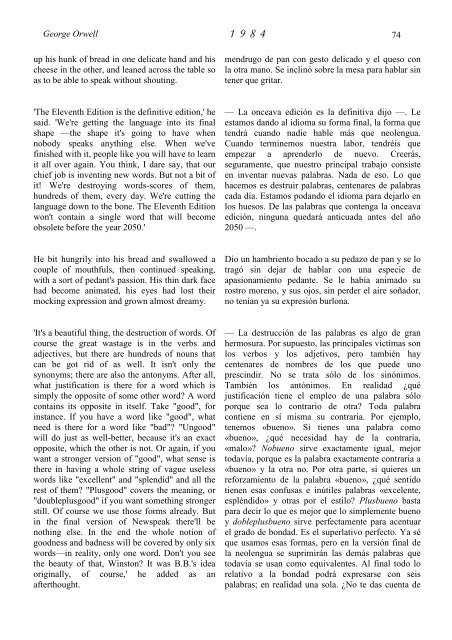Create successful ePaper yourself
Turn your PDF publications into a flip-book with our unique Google optimized e-Paper software.
George Orwell 1 9 8 4<br />
up his hunk of bread in one delicate hand and his<br />
cheese in the other, and leaned across the table so<br />
as to be able to speak without shouting.<br />
'The Eleventh Edition is the definitive edition,' he<br />
said. 'We're getting the language into its final<br />
shape —the shape it's going to have when<br />
nobody speaks anything else. When we've<br />
finished with it, people like you will have to learn<br />
it all over again. You think, I dare say, that our<br />
chief job is inventing new words. But not a bit of<br />
it! We're destroying words-scores of them,<br />
hundreds of them, every day. We're cutting the<br />
language down to the bone. The Eleventh Edition<br />
won't contain a single word that will become<br />
obsolete before the year 2050.'<br />
He bit hungrily into his bread and swallowed a<br />
couple of mouthfuls, then continued speaking,<br />
with a sort of pedant's passion. His thin dark face<br />
had become animated, his eyes had lost their<br />
mocking expression and grown almost dreamy.<br />
'It's a beautiful thing, the destruction of words. Of<br />
course the great wastage is in the verbs and<br />
adjectives, but there are hundreds of nouns that<br />
can be got rid of as well. It isn't only the<br />
synonyms; there are also the antonyms. After all,<br />
what justification is there for a word which is<br />
simply the opposite of some other word? A word<br />
contains its opposite in itself. Take "good", for<br />
instance. If you have a word like "good", what<br />
need is there for a word like "bad"? "Ungood"<br />
will do just as well-better, because it's an exact<br />
opposite, which the other is not. Or again, if you<br />
want a stronger version of "good", what sense is<br />
there in having a whole string of vague useless<br />
words like "excellent" and "splendid" and all the<br />
rest of them? "Plusgood" covers the meaning, or<br />
"doubleplusgood" if you want something stronger<br />
still. Of course we use those forms already. But<br />
in the final version of Newspeak there'll be<br />
nothing else. In the end the whole notion of<br />
goodness and badness will be covered by only six<br />
words—in reality, only one word. Don't you see<br />
the beauty of that, Winston? It was B.B.'s idea<br />
originally, of course,' he added as an<br />
afterthought.<br />
mendrugo de pan con gesto delicado y el queso con<br />
la otra mano. Se inclinó sobre la mesa para hablar sin<br />
tener que gritar.<br />
— La onceava edición es la definitiva dijo —. Le<br />
estamos dando al idioma su forma final, la forma que<br />
tendrá cuando nadie hable más que neolengua.<br />
Cuando terminemos nuestra labor, tendréis que<br />
empezar a aprenderlo de nuevo. Creerás,<br />
seguramente, que nuestro principal trabajo consiste<br />
en inventar nuevas palabras. Nada de eso. Lo que<br />
hacemos es destruir palabras, centenares de palabras<br />
cada día. Estamos podando el idioma para dejarlo en<br />
los huesos. De las palabras que contenga la onceava<br />
edición, ninguna quedará anticuada antes del año<br />
2050 —.<br />
Dio un hambriento bocado a su pedazo de pan y se lo<br />
tragó sin dejar de hablar con una especie de<br />
apasionamiento pedante. Se le había animado su<br />
rostro moreno, y sus ojos, sin perder el aire soñador,<br />
no tenían ya su expresión burlona.<br />
— La destrucción de las palabras es algo de gran<br />
hermosura. Por supuesto, las principales víctimas son<br />
los verbos y los adjetivos, pero también hay<br />
centenares de nombres de los que puede uno<br />
prescindir. No se trata sólo de los sinónimos.<br />
También los antónimos. En realidad ¿qué<br />
justificación tiene el empleo de una palabra sólo<br />
porque sea lo contrario de otra? Toda palabra<br />
contiene en sí misma su contraria. Por ejemplo,<br />
tenemos «bueno». Si tienes una palabra como<br />
«bueno», ¿qué necesidad hay de la contraria,<br />
«malo»? Nobueno sirve exactamente igual, mejor<br />
todavía, porque es la palabra exactamente contraria a<br />
«bueno» y la otra no. Por otra parte, si quieres un<br />
reforzamiento de la palabra «bueno», ¿qué sentido<br />
tienen esas confusas e inútiles palabras «excelente,<br />
espléndido» y otras por el estilo? Plusbueno basta<br />
para decir lo que es mejor que lo simplemente bueno<br />
y dobleplusbueno sirve perfectamente para acentuar<br />
el grado de bondad. Es el superlativo perfecto. Ya sé<br />
que usamos esas formas, pero en la versión final de<br />
la neolengua se suprimirán las demás palabras que<br />
todavía se usan como equivalentes. Al final todo lo<br />
relativo a la bondad podrá expresarse con seis<br />
palabras; en realidad una sola. ¿No te das cuenta de<br />
74


